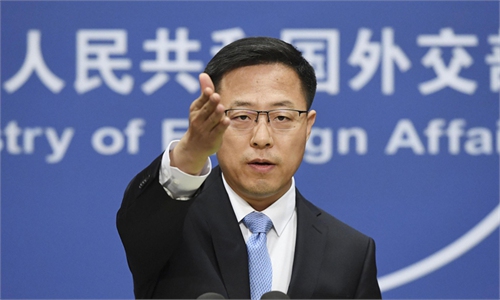
Canada's choice Illustration: Tang Tengfei/GT
China's emergence as the world's only major economy with a positive economic growth amid the global pandemic is a strong incentive for the EU and other countries eager to get out of the economic slump.China and the European Union (EU) jointly announced the completion of negotiations on the China-EU bilateral investment treaty (BIT) as scheduled on December 30, 2020. Despite objections from the US, the EU went on to strike a deal with China.
Canada, a member of the Five Eyes alliance, has yet to take a public position on this agreement. In fact, the China-EU BIT will have a great impact on Canada's policy toward the US and China. Therefore, Canada should draw lessons from the progress of the BIT to set a wise and proper course to reshape its relationship with China.
Currently, China has further removed major barriers to market access for EU investment in China, including obligations to prohibit forced technology transfer, rules for full transparency on subsidy claims, and commitments related to sustainable development. The agreement has become the cornerstone of economic relations between China and Europe. It also provides a major model for Canada to emulate.
Another reason why Europe was eager to strike a deal with China is that the US is no longer a reliable partner.
The extreme protectionism of the US has discouraged its allies. While targeting those so-called US rivals like China with sanctions, the Trump administration also slapped tariffs on the products of its allies including Canada, France and Germany.
Though the incoming Biden administration says it will restore the relationship with its allies, it's still unclear how that will happen.
Thus, the EU believes that even a Biden administration will not be able to fundamentally repair their relationship.
In response to the appeals of Rust Belt states, Biden is anticipated to continue with protectionist policies, albeit in a different way from Trump.
Canada now is facing many challenges.
One challenge comes from the US' stepped-up pressure on Canada. With Huawei CFO Meng Wanzhou's arrest as a sign, the US has asked Canada to follow its China policy much closer, forcing it to take sides on a range of issues, from Huawei's 5G to the Xinjiang question.
The second challenge is the deteriorating relationship between China and Canada.
Since Meng's case, there have been many trade frictions between China and Canada. Canada interfered in China's internal affairs over issues such as Xinjiang and Hong Kong, and sent warships to the Taiwan Straits to provoke. Bilateral relations then have fallen to their lowest point since the establishment of diplomatic ties between the two countries.
The third challenge comes from the transformation of the economic and trade relationship between the US and Canada. Thousands of oil wells in Canada's western provinces have been shut down in recent years due to the lack of demand as the US pushes for energy independence; at the same time more and more US companies are looking to Mexico for investment.
As a result, stabilizing the relationship between China and Canada is an inevitable choice for Canada to safeguard its diplomatic independence and national interests, and respond to the economic and trade structural transformation with its southern neighbor.
In the time of economic recovery, China has proven to be an attractive choice both in terms of trade and investment. Canada's exports to China grew by more than 4 percent in the first three quarters of 2020, with iron ore up by 97 percent and pork up by 165 percent, which shows the complementarity and potential of the trade structure between China and Canada.
The two countries were important economic and trade partners before Meng's arrest. Since the establishment of the strategic partnership in 2005, the economic and trade cooperation between the two countries has entered the stage of all-round cooperation. Their trade has gradually developed from the single trade of goods to all-round, cross-field, and diversified economic and technological cooperation.
These sound foundations, if the Meng case can be properly handled, will provide a steady boost to trade, investment and cooperation between China and Canada.
The author is a researcher of the Center for Canadian Studies of Guangzhou Institute of Foreign Languages. opinion@globaltimes.com.cn



